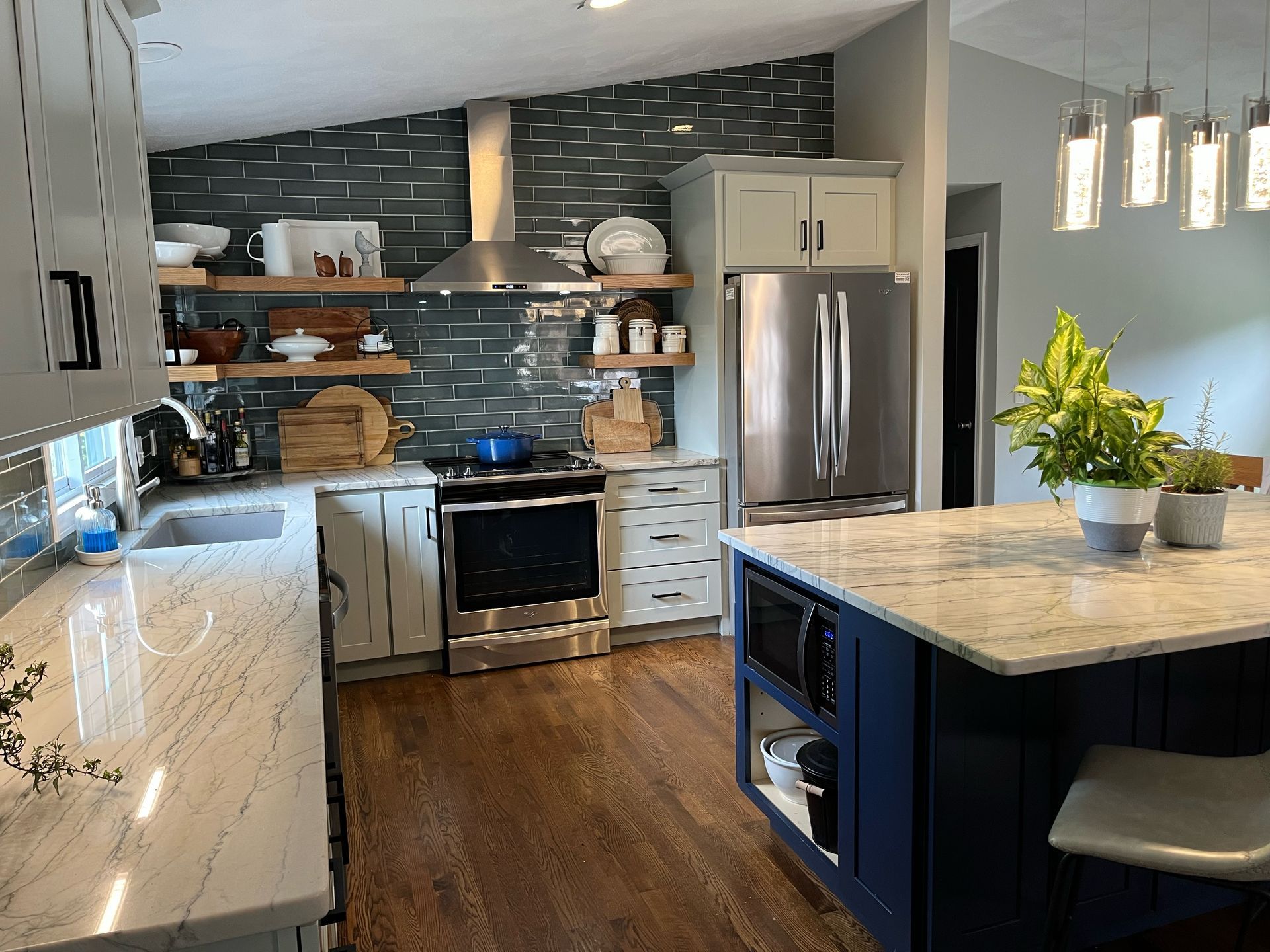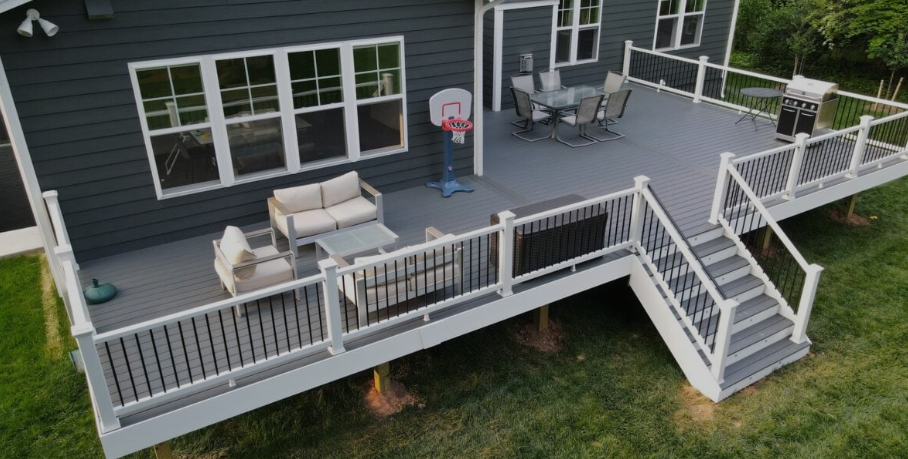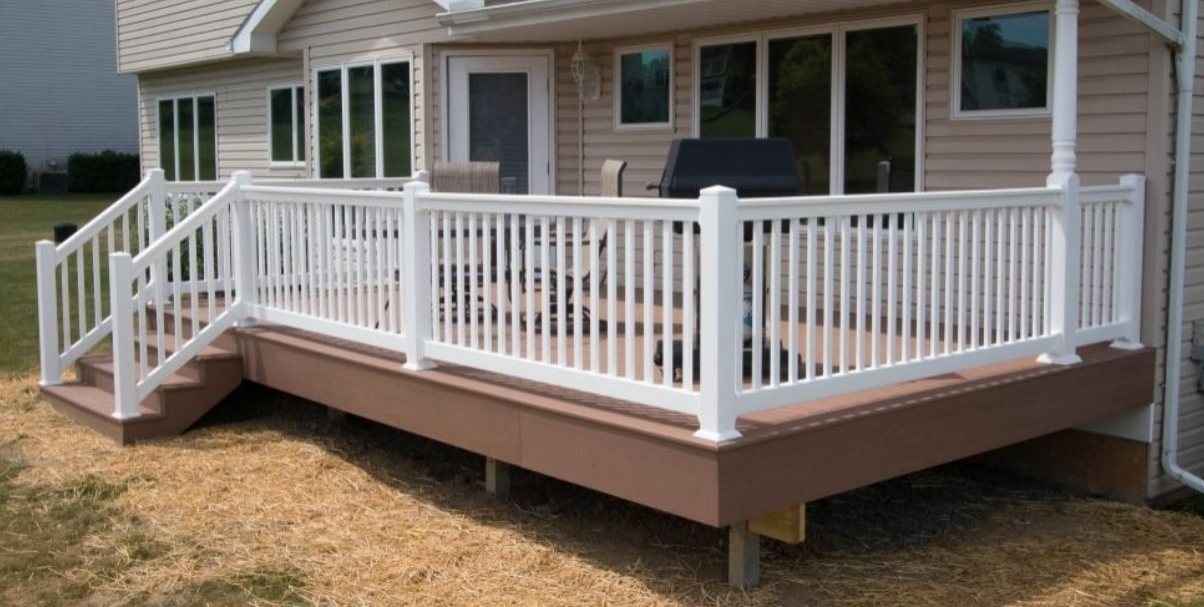Dumpster Rental for a Roofing Job - Rhode Island
Replacing your roof creates an enormous amount of heavy debris in a very short time. Whether you're re-roofing your Providence triple-decker, replacing shingles on your Warwick ranch home, or updating your Newport coastal cottage, proper debris disposal is essential for a smooth roofing project. This comprehensive guide covers everything Rhode Island homeowners and contractors need to know about dumpster rentals for roofing jobs.
What Size Dumpster Do You Need for a Roofing Job in Rhode Island?
Roofing projects require careful dumpster sizing due to weight concerns:
15-Yard Dumpster (12' L × 7.6' W × 4.6' H) - $475.00
- Best for: Small roofing jobs, garage roofs, shed roofs, partial roof sections
- Capacity: 4-5 pickup truck loads
- Weight limit: 2 tons included
- Rental period: Up to 7 days
- Additional days: $8/day
- Extra weight: $140/ton over limit
- Typical coverage: 800-1,200 sq ft of roofing
- IMPORTANT: Asphalt shingles are HEAVY - may exceed 2-ton limit on larger sections
20-Yard Dumpster (14' L × 8' W × 6.5' H) - $540.00
- Best for: Complete residential roofing projects, most Rhode Island homes
- Capacity: 6-8 pickup truck loads
- Weight limit: 2 tons included
- Rental period: Up to 7 days
- Additional days: $8/day
- Extra weight: $140/ton over limit
- Typical coverage: 1,200-2,000 sq ft of roofing
- Extra height (6.5'): Better for roofing bundles, underlayment, trim
- CRITICAL: Full roof may still exceed 2-ton limit - budget for overage
Why Roofing Projects Are Unique:
- Asphalt shingles are THE HEAVIEST common material (10-15 lbs per sq ft with underlayment)
- Size matters less than weight for roofing
- Many complete roof projects exceed 2-ton limit
- Overage fees at $140/ton are expected and reasonable
- Volume is often less important than weight capacity
Understanding Roofing Weight: The Most Important Factor
Critical Information About Roofing Debris Weight:
Roofing materials are significantly heavier than most other household debris. Understanding weight is essential for budgeting and planning.
Asphalt Shingle Weight:
- One square (100 sq ft): 200-300 lbs of old shingles
- With underlayment and nails: 250-350 lbs per square
- Typical Rhode Island home (15-20 squares): 3,750-7,000 lbs (1.9-3.5 tons)
Weight Examples by Roof Size:
Small Roof (800-1,000 sq ft / 8-10 squares):
- Shingles + underlayment: 2,000-3,000 lbs (1-1.5 tons)
- Verdict: Likely stays within 2-ton limit
- Recommended: 15-yard ($475) adequate
- Overage: Probably none
Medium Roof (1,200-1,500 sq ft / 12-15 squares):
- Shingles + underlayment: 3,000-4,500 lbs (1.5-2.25 tons)
- Verdict: May slightly exceed 2-ton limit
- Recommended: 20-yard ($540) for volume
- Overage: Possibly 0.25-0.5 tons ($35-$70)
Large Roof (1,800-2,200 sq ft / 18-22 squares):
- Shingles + underlayment: 4,500-7,000 lbs (2.25-3.5 tons)
- Verdict: WILL exceed 2-ton limit
- Recommended: 20-yard ($540)
- Overage: Expect 0.5-1.5 tons ($70-$210)
Extra Large Roof (2,500+ sq ft / 25+ squares):
- Shingles + underlayment: 6,250-8,750 lbs (3.1-4.4 tons)
- Verdict: Significantly exceeds 2-ton limit
- Recommended: 20-yard ($540), consider two dumpsters
- Overage: Expect 1-2+ tons ($140-$280+)
Other Roofing Materials:
Wood Shingles/Shakes:
- Lighter than asphalt (3-5 lbs per sq ft)
- Better chance staying under 2 tons
- Volume becomes more important
Slate Roofing:
- EXTREMELY HEAVY (7-10 lbs per sq ft)
- Specialized disposal often required
- May need dedicated slate dumpster
- Historic homes (Newport, Providence)
Metal Roofing:
- Lighter than shingles (1-3 lbs per sq ft)
- Usually no weight concerns
- Volume-based sizing sufficient
Flat Roof Materials:
- Built-up roofing (tar and gravel): VERY HEAVY
- Modified bitumen: Heavy
- Rubber membrane (EPDM): Lighter
- Varies significantly by type
Multiple Layers:
- Rhode Island homes often have 2-3 layers
- Each additional layer adds 200-350 lbs per square
- Doubles or triples weight calculations
- WILL require multiple dumpsters or heavy overages
How Much Does a Roofing Dumpster Cost in Rhode Island?
Realistic Total Project Costs:
15-Yard Dumpster for Small Roofing Jobs:
- Base price: $475.00
- Includes: Up to 7 days, 2 tons
- Typical weight overage: 0-0.5 tons
- Overage cost: $0-$70
- Total typical cost: $475-$545
- Best for: Garages, sheds, small sections
20-Yard Dumpster for Most Residential Roofs:
- Base price: $540.00
- Includes: Up to 7 days, 2 tons
- Typical weight overage: 0.5-1.5 tons
- Overage cost: $70-$210
- Total typical cost: $610-$750
- Best for: Most Rhode Island homes
What's Included:
- Delivery to your Rhode Island property
- Placement near roofing work area
- Up to 7-day rental period
- 2-ton weight allowance
- Pickup and proper disposal
- Customer support
Additional Costs:
- Permit fees: $25-$50 if street placement (varies by city)
- Driveway protection: ESSENTIAL for roofing dumpsters (heavy!)
- Extended rental: $8/day (roofing usually quick, rarely needed)
- Weight overage: $140/ton (EXPECTED for most roofing jobs)
Cost Comparison:
- DIY with dumpster: $475-$750 total
- Multiple dump runs: $50-100 per trip, 8-15 trips needed, exhausting
- Contractor disposal (included): Often $300-$800 added to roofing quote
- Junk removal service: Not practical for roofing (too heavy, too fast)
Budgeting for Your Roofing Project:
- Always budget for weight overage
- $540 base + $140 estimated overage = $680 realistic budget
- Still much cheaper than alternatives
- Contractors often include dumpster in roofing quote
When to Rent a Dumpster for Your Roofing Job
Best Seasons for Rhode Island Roofing Projects:
Summer (June-August): PEAK ROOFING SEASON
- Warmest, driest weather
- Shingles seal properly in heat
- Longest daylight hours
- Highest contractor demand
- Book dumpster 2-3 weeks ahead
- Busiest time for roofing dumpsters
Late Spring (May): EXCELLENT
- Good weather emerging
- Contractors available
- Before peak summer rush
- Comfortable working temperatures
- Book 1-2 weeks ahead
Early Fall (September-October): IDEAL
- Beautiful weather
- Moderate temperatures
- Less demand than summer
- Complete before winter
- Book 1-2 weeks ahead
Late Fall (November): POSSIBLE
- Cooler temperatures
- Shorter days
- Weather less reliable
- Must complete before snow
- Good availability
Winter (December-March): AVOID
- Too cold for shingle installation
- Shingles won't seal properly
- Snow and ice hazards
- Difficult working conditions
- Emergency repairs only
Rhode Island Weather Considerations:
- Summer: Hot on roof (100°F+), early morning work best
- Hurricane season: August-October, watch forecasts
- Nor'easters: October-April, can delay projects
- Ice dams: Common problem, drives spring roofing demand
What Goes in a Roofing Dumpster?
Accepted Roofing Materials:
Asphalt Shingles:
- Old architectural shingles
- Three-tab shingles
- Damaged or torn shingles
- Most common Rhode Island roofing material
- HEAVY - main weight contributor
Underlayment:
- Tar paper (felt paper)
- Synthetic underlayment
- Ice and water shield
- Adds significant weight
Flashing and Trim:
- Metal flashing (valleys, chimneys)
- Drip edge
- Step flashing
- Ridge vents
- Soffit and fascia (if replacing)
Gutters and Downspouts:
- Old gutter sections
- Downspouts
- Gutter guards
- Hangers and hardware
Roof Penetrations:
- Old vent pipes
- Bathroom fan vents
- Ridge vents
- Turbine vents
- Skylights (if removing)
Structural Materials (if repairing):
- Damaged plywood decking
- Rotted roof boards
- Damaged trusses or rafters (limited)
Debris:
- Nails and fasteners
- Packaging from new shingles
- Plastic wrapping
- Leftover materials
Prohibited Items:
- Tires (separate disposal, tire fees may apply)
- Hazardous materials (though roofing adhesives are typically OK)
- Paint cans (separate disposal)
- Batteries or electronics
- Asbestos roofing (requires certified abatement if pre-1980)
Rhode Island Roofing Dumpster Placement Strategy
Optimal Placement for Roofing Projects:
Driveway Placement (Most Common):
- Advantages: Stable surface, good access, close to house
- Considerations:
- MUST use plywood protection (roofing shingles extremely heavy)
- Summer heat + heavy dumpster = driveway damage risk
- 3/4" plywood sheets under all contact points
- Position for shingle chute access
- Best for: Most residential roofing projects
Street Placement:
- When necessary: No driveway, or driveway blocked by roofing materials
- Requires: Municipal permit ($25-$50)
- Considerations:
- Not blocking traffic
- Roofing debris falling from roof
- Contractor vehicle parking needs
- Permit required in most Rhode Island cities
Yard Placement:
- Rarely used for roofing
- Ground may not support weight
- Damage to lawn from heavy roofing debris
- Difficult access for loading
- Only if no other option
Positioning for Maximum Efficiency:
Distance from House:
- 10-20 feet ideal
- Close enough for debris chute
- Far enough for safety
- Consider falling shingles and materials
Access Considerations:
- Roofing crew needs room to work
- Material delivery truck access
- Homeowner vehicle access during project
- Emergency vehicle access maintained
Safety Zone:
- Clear area around dumpster
- No pedestrian traffic
- Away from children's play areas
- Visible signage if near street
Driveway Protection is ESSENTIAL:
- Roofing dumpsters are among the heaviest
- Summer heat softens asphalt
- 3/4" plywood boards minimum
- Place under all dumpster contact points
- Prevent $1,000+ driveway repairs
- Small investment prevents major expense
Roofing Dumpster Rental Timeline
Typical Roofing Project Schedule:
2-3 Weeks Before Project:
- Get roofing quotes from contractors
- Schedule roofing work date
- Book dumpster rental
- Obtain permits if needed (roofing and dumpster)
- Order roofing materials
1 Week Before:
- Confirm dumpster delivery date
- Confirm with roofing contractor
- Clear driveway and work area
- Purchase plywood for driveway protection
- Notify neighbors (noise, debris, parking)
Day Before Roofing:
- Place plywood driveway protection
- Clear around house perimeter
- Move vehicles away from house
- Secure outdoor items (debris falls!)
- Final contractor confirmation
Roofing Day 1 (Morning - Dumpster Delivery):
- Dumpster delivered early morning (6-7am)
- Positioned for optimal access
- Roofing crew arrives and sets up
- Tear-off begins (loudest phase)
- Dumpster fills rapidly
Roofing Day 1-2 (Tear-Off Complete):
- Old shingles removed
- Dumpster 50-80% full typically
- Inspection of decking
- Any repairs to roof deck
- Clean-up of roof surface
Roofing Day 2-3 (New Roof Installation):
- New underlayment installed
- New shingles applied
- Flashing and trim work
- Ridge vents and details
- Additional debris (packaging)
Roofing Day 3-4 (Completion):
- Final shingles and details
- Gutter work if included
- Ground cleanup
- Final debris to dumpster
- Inspection and walkthrough
Day After Completion (Dumpster Pickup):
- Schedule pickup or use predetermined date
- Dumpster removed
- Driveway protection removed
- Clean driveway
- Project complete!
Realistic Timelines:
- Small roof (1,000 sq ft): 1-2 days
- Average roof (1,500 sq ft): 2-3 days
- Large roof (2,000+ sq ft): 3-5 days
- Multiple layers or repairs: Add 1-2 days
- 7-day rental: More than adequate for any residential roof
- Weather delays: Extensions only $8/day
Roofing Jobs by Rhode Island Property Type
Providence Triple-Decker Roofing
Unique Challenges:
- Large roof surface (3 floors = substantial area)
- Often 2-3 layers of old shingles
- Urban access limitations
- Narrow streets and parking challenges
Typical Providence Triple-Decker Roof:
- 2,000-3,000 sq ft total roof area
- Multiple roof sections (flat and pitched)
- 20+ squares common
- Heavy debris load (2.5-4 tons typical)
Recommended: 20-Yard ($540)
- Essential for volume
- WILL exceed 2-ton weight limit
- Budget $680-$820 total (base + overage)
- May need two dumpsters for multiple layers
Placement Challenges:
- Street permits often required
- Coordinate with neighbors
- Limited driveway space
- Debris chute positioning critical
Popular Providence Neighborhoods:
- Federal Hill: Narrow streets, parking challenges
- Smith Hill: Multi-family roofing common
- West End: Triple-decker renovations
- Mount Pleasant: Established housing stock
Warwick Ranch Home Roofing
Characteristics:
- Single-story ranch homes
- Simple roof lines
- 1,200-1,800 sq ft typical
- Easier access and placement
Typical Warwick Ranch Roof:
- 12-18 squares
- Usually single layer
- Straightforward tear-off
- Moderate weight (2-3 tons)
Recommended: 20-Yard ($540)
- Adequate volume for complete roof
- May slightly exceed 2-ton limit
- Budget $610-$680 total
Placement Advantages:
- Excellent driveway access
- Ample space for dumpster
- Good working area
- Rarely need street permits
Popular Warwick Areas:
- Conimicut: 1950s-60s ranch homes
- Oakland Beach: Coastal properties
- Apponaug: Suburban neighborhoods
- Warwick Neck: Waterfront homes
Cranston Colonial Home Roofing
Characteristics:
- Two-story Colonial architecture
- Steeper roof pitches
- 1,500-2,200 sq ft roof area
- Architectural shingles common
Typical Cranston Colonial Roof:
- 15-22 squares
- Steeper pitch = more material
- Quality construction
- May have multiple layers
Recommended: 20-Yard ($540)
- Necessary for full Colonial roof
- Expect weight overage
- Budget $680-$750 total
Edgewood Historic District:
- Older homes, careful work
- Historic appearance requirements
- Quality materials
- Professional contractors
Garden City and Western Cranston:
- Mid-century Colonials
- Original roofs being replaced
- Standard residential sizing
- Good access typical
Coastal Rhode Island Roofing (Newport, Narragansett)
Unique Coastal Factors:
- Salt air corrosion (shorter roof life)
- Hurricane exposure
- Wind-driven rain
- Premium materials common
Newport Roofing:
- Historic cottages and mansions
- Wide variety of roof types
- Slate and metal common (historic)
- Modern asphalt on newer sections
Coastal Home Roof Sizes:
- Small cottages: 1,000-1,500 sq ft
- Large estates: 3,000-5,000+ sq ft
- Highly variable
Recommended Sizing:
- Small coastal homes: 15-yard may work
- Standard homes: 20-yard essential
- Large estates: Multiple dumpsters likely
Coastal Considerations:
- Tourist season access challenges
- Book early in spring/fall (avoid summer crowds)
- Wind concerns (secure loose materials)
- Premium service expectations
South County Rural Home Roofing
Characteristics:
- Mix of architectural styles
- Larger properties
- Good access typical
- Beautiful settings
Narragansett, South Kingstown, Westerly:
- Beach houses (smaller roofs)
- Rural homes (larger roofs)
- Mix of old and new construction
- Seasonal property considerations
Typical Roof Sizes:
- Beach cottages: 1,200-1,800 sq ft
- Year-round homes: 1,500-2,500 sq ft
- Farmhouses: 2,000-3,000 sq ft
Recommended: 20-Yard ($540)
- Standard for most South County homes
- Adequate capacity
- Budget for weight overage
Northern Rhode Island Roofing
Woonsocket, Burrillville, North Smithfield:
- Multi-family homes common
- Working-class neighborhoods
- Practical roof replacements
- Value-conscious approach
Typical Characteristics:
- 1,500-2,500 sq ft roofs
- Often multiple layers (removed less frequently)
- Straightforward projects
- Good contractor availability
Recommended: 20-Yard ($540)
- Standard sizing
- Handles typical northern RI roof
- Multiple layers may require extra capacity
Working with Roofing Contractors and Dumpster Rentals
Contractor-Arranged Dumpster:
Pros:
- Included in total quote
- Contractor handles logistics
- Coordinated delivery and pickup
- One point of contact
Cons:
- Often marked up 20-30%
- Less control over placement
- May use smaller dumpster (multiple needed)
- Included in total price (less transparent)
Homeowner-Arranged Dumpster:
Pros:
- Save $100-$300 typically
- Direct control over sizing and placement
- Choose delivery/pickup timing
- Transparent pricing
Cons:
- Coordinate with contractor
- Ensure proper timing
- Responsible for permits if needed
Best Practice:
- Get roofing quote with and without dumpster
- Compare to direct rental (Rockhouse Disposal)
- Often save significantly arranging yourself
- Coordinate carefully with contractor schedule
Communication is Key:
- Tell contractor you're arranging dumpster
- Confirm delivery date matches roofing start
- Discuss optimal placement together
- Ensure 7-day rental covers project timeline
Protecting Your Property During Roofing Projects
Driveway Protection:
- Roofing dumpsters are HEAVIEST common dumpster use
- Summer heat + heavy shingles + dumpster weight = high damage risk
- 3/4" plywood sheets under all contact points
- Not optional—essential!
- Cost: $20-40 for plywood
- Prevents: $1,000-3,000 driveway repair
Landscaping Protection:
- Debris will fall around house perimeter
- Move planters and decorations
- Cover gardens and flower beds
- Expect some grass damage (recoverable)
- Lay tarps in high-traffic areas
Vehicle Protection:
- Move cars away from house (20+ feet minimum)
- Falling shingles and nails damage vehicles
- Park on street or away from work area
- Entire project duration
Home Exterior:
- Siding may get scuffed (usually minor)
- Windows covered by contractor typically
- Outdoor furniture moved away
- AC units protected
Neighbor Considerations:
- Roofing is LOUD (tear-off especially)
- Notify neighbors in advance
- Typical hours: 7am-6pm
- 2-3 days of noise
- Dumpster may impact their parking
- Courtesy goes a long way
Roofing Dumpster Loading Tips
Efficient Loading (Usually Contractor's Job):
Debris Chute Method:
- Most common approach
- Chute from roof directly to dumpster
- Fast and efficient
- Minimizes ground mess
- Position dumpster for chute access
Ground Loading:
- Carry bundles down ladder
- Load directly into dumpster
- More labor-intensive
- Better control over loading
- Good for smaller jobs
Optimal Loading Strategy:
- Heaviest materials on bottom (old shingles)
- Underlayment and felt paper
- Flashing and metal materials
- Packaging from new materials
- Final sweep debris on top
What Contractors Know:
- Shingles compact as loaded
- Dumpster often looks less full than it is
- Weight matters more than volume
- Don't overfill (safety and transport)
Do You Need a Permit for a Roofing Dumpster in Rhode Island?
Dumpster Permit Requirements:
NO Permit Needed:
- Dumpster on driveway
- On your private property
- Not blocking public areas
- Most common for roofing projects
Permit Required:
- Dumpster on public street
- Blocking sidewalk
- In front of property on city land
- Dense urban neighborhoods
Rhode Island City Roofing Permits:
Providence:
- Roofing permit: Required for work
- Dumpster permit (if street): (401) 680-5450, $25-$50
- Dense neighborhoods often need street placement
Warwick:
- Roofing permit: Required
- Dumpster permit (if street): (401) 738-2000 ext. 6400, ~$35
- Most have driveways (permit rare)
Cranston:
- Roofing permit: Required
- Dumpster permit: (401) 461-1000 ext. 3154
- Suburban setting, usually on-property
Pawtucket:
- Roofing permit: Required
- Dumpster permit: (401) 728-0500
- Urban setting, permits more common
Newport:
- Roofing permit: Required (historic district scrutiny)
- Dumpster permit: (401) 845-5800
- Tourist season considerations
Other Cities:
- Contact local building department
- Roofing permit always required
- Dumpster permit varies by placement
Roofing Contractor Usually Handles:
- Roofing permits (required)
- May assist with dumpster permits
- Knows local requirements
- Experienced with process
Roofing Dumpster Rental FAQs
Q: What size dumpster do I need for my roof? A: Most Rhode Island homes (1,200-2,000 sq ft roof) need a 20-yard dumpster ($540). Smaller roofs under 1,000 sq ft may fit in 15-yard ($475). Calculate roof square footage and consider 15-20 lbs per sq ft for weight.
Q: Will I exceed the 2-ton weight limit? A: Probably yes if your roof is over 1,200 sq ft. Roofing shingles are extremely heavy (200-350 lbs per 100 sq ft). Budget for $70-$210 weight overage on typical roofs. This is normal and expected for roofing projects.
Q: How long will my roofing project take? A: Most residential roofs: 2-3 days. Small roofs: 1-2 days. Large or complex roofs: 3-5 days. The 7-day dumpster rental is more than adequate for any residential roofing job.
Q: When should the dumpster be delivered? A: Morning of day 1 of roofing work (tear-off day). Roofing crews start early (7am) and need the dumpster immediately. Coordinate exact timing with your contractor.
Q: Can I get a smaller dumpster to save money? A: Not recommended. Roofing debris is heavy and voluminous. A too-small dumpster means multiple rentals (more expensive) or overfilled dumpster (safety issue). The 20-yard is standard for good reason.
Q: What if it rains during my roofing project? A: Roofing stops during rain. Your dumpster rental period continues. Extensions are only $8/day if weather delays extend your project. Most roofing projects complete despite brief weather delays.
Q: Should I rent the dumpster or let my contractor include it? A: Compare prices. Contractors often mark up dumpster rental 20-30% ($150-$250 extra). Renting directly from Rockhouse Disposal typically saves $100-$300. Just coordinate timing with your contractor.
Q: How much does roofing debris weigh? A: Asphalt shingles with underlayment: 10-15 lbs per square foot. A 1,500 sq ft roof = 15,000-22,500 lbs (7.5-11.25 tons) if removing everything. Most homes exceed the 2-ton dumpster limit - this is expected.
Q: Can I put other debris in with roofing materials? A: Yes, but roofing is so heavy that adding other materials may increase weight overage. Stick to roofing debris for most accurate weight management.
Q: Will the dumpster damage my driveway? A: Only if you don't protect it! ALWAYS use 3/4" plywood boards under the dumpster, especially in summer. Roofing dumpsters are the heaviest due to shingle weight.
Q: What about multiple layers of shingles? A: Each layer adds 200-300 lbs per 100 sq ft. Two layers doubles the weight. Three layers triples it. You may need two dumpsters or expect significant weight overages ($280-$420+).
Q: Do I need a permit? A: Only if placing dumpster on street. Driveway placement (most common) doesn't require dumpster permit. You DO need roofing permit (contractor typically handles).
Rockhouse Disposal specializes in roofing project dumpster rentals throughout Rhode Island. We understand roofing debris - it's heavy, it's generated quickly, it requires proper sizing and placement, and weight overages are expected and normal. We provide transparent pricing so you know exactly what to expect, and we work with both homeowners and roofing contractors to ensure timely delivery and pickup.











